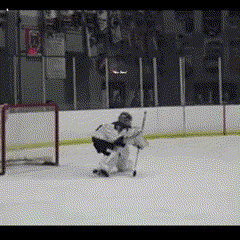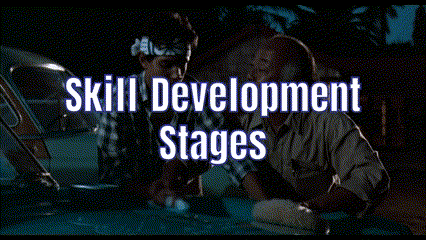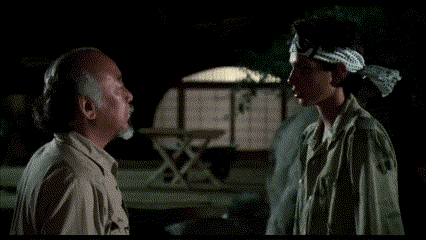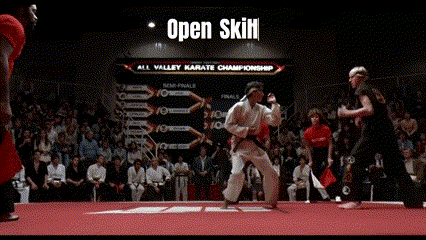
Kachinas’ goalie parents and coaches, this is Goaltending Director Hiroki Wakabayashi.


Part 1 : Wax On, Wax Off – Skill Development Stages
“Only root karate come from Miyagi.
Just like bonsai choose own way grow because root strong
you choose own way do karate same reason.”
Mr. Miyagi (Karate Kid)
Nothing makes goalie coaches happier than seeing the goalie students applying the skills they’ve worked on into the game situations. It’s the sign of the goalies are buying into the instructions and the goaltending development program is working well.

“Practice like you play and play like you practice.” sounds so simple but not easy to achieve,,, and in fact, I don’t see it very often because the drills and real game situations can be easily disconnected if not structured correctly.
Here are the three stages of skill development that structures our goalie training.
1. Mechanics
Mechanics are the inevitable fundamentals of the skills. It could be all kinds of edge control, body control, stick handling, hand-eye coordination, etc.
Mechanics training might look very different from real game situations because it focuses on the specific part of the movement that is required for the skill and often is exaggerated on purpose.
For example, you don’t jump and flip 180 in game but it’s a great balance and edge work drill to make you a better skater. Here’s the perfect example of the mechanics training.

2. Closed Skill
The next stage is called Closed Skill which is a specific movement you use in games but without decision makings.
Typical example is like a drill that a coach calls for the glove shot and you make the glove save. You know the shot is always coming to your glove so you can only focus on the quality of the glove save such as tracking the puck, catching it in front of your chest line, etc.

3. Open Skill
After you develop the mechanics and closed skills to a certain level, you can start the Open Skill training, which is more game like situations with some options for decision makings.
For example, the shooter can shoot anywhere, or can even pass to another shooter and you have to choose appropriate saving selection depending on the situations.
As you can imagine, you’d struggle in open skill drills (or in real games) if your mechanics and closed skills are not developed enough.
Since you can’t fix your T-push edgeworks during the 2 on 1 drill, goalies often develop bad habits of just trying to stop the puck by throwing body parts, or simply give up and become lazy if they just practice with team and play game without working on mechanics and closed skills consistently.
Therefore, goalies must have goalies only trainings besides the team training drills (which are most likely open skills) in order to develop great mechanics and closed skills within controlled environment.

You, of course need to play plenty of games to learn how to read the game and apply specific closed skills into given situations but you have to make sure to have time to develop mechanics and closed skills first.
Invest your money wisely in spring/summer time. Tournaments are fun and might give you some exposures but just playing games won’t develop your fundamental. Goalie camp or hockey camp with great goalie instructions will give you chance to work on mechanics and closed skills without worrying about the scoreboard and the scouts in the stand.
Remember, you can only thrive as strong as your root is.
Hiroki Wakabayashi
Part 2 : How to Spend The Off Season
We have a contribution from our goalie coach Jen Taylor about how to spend the off season.
MUST READ!
First I wanted to congratulate and thank all of you for your dedication and hard work this past season. Your consistent effort and commitment has paid off, and it was amazing for me to see how far everyone came after I returned to coaching in February. Our goal is to continue to give you all the tools to further your development. With that being said, I wanted to highlight 8 items to consider during the off season to help you all move towards your goals.
1. Rest and Recover
Take time to test and recover from this season physically, mentally, and emotionally. A few weeks away from the game will give your body a chance to heal damaged tissues. During this time, focus on quality sleep, proper nutrition, hydration, and relaxation. If you have any lingering injuries or pains, take this time to be evaluated by a professional and have a plan in place to heal. Prioritizing rest and recovery now will help keep you healthy and so you can perform your best next season.
2. Use this time to Reflect
Learn, and Grow: There are many ways to evaluate your performance this season and it will be helpful for you to spend time reflecting prior to setting goals for development and the next season. This will help give clarity on what needs to be prioritized over summer and the upcoming season, which will help with effective goal setting. Journaling your thoughts by using prompts or allowing a “stream of consciousness” can help you identify patterns. In terms of prompts, I am a fan of reflecting on “The Good, The Bad, and The Ugly” in various categories. You may also do SWOT analysis and identify your strengths, weaknesses, opportunities, and threats to help understand strategies to improve over summer. Having honest and sincere feedback from coaches and teammates can also help you reflect and learn from the season. Once you get your feed back or information organized, ask yourself “What can I learn from this experience and how can I use it to become better?”
3.Think about where you want to be next year and set some goals
There is not a right way or a wrong way to set a goal, and any goal is better than no goal at all. By having a goal, you give yourself a target to strive for. As goalies, our goal is to stop as many pucks as we can so our team can have a chance to win games. So your goals should revolve around becoming the best version of you that can also stop pucks. You can have fun with goal setting. Vision boards, visualization, SMART goals *specific, measurable, achievable, relevant, and time-bound” are all great tools to help keep you focused and motivated while you train to achieve your goal. I recommend looking at them daily and keeping it fun.
4. Play other sports and participate in other activities
Other sports are important for improving athleticism, strength and conditioning. There are many sports and activities that complement hockey including soccer, lacrosse, track and field. The benefits of cross training is that different areas of the body are trained and developed which allow for better athletic development and decreased injury risk. Consistently putting the body through repetitive motions over the years can strain joints, so it is important to give them a periodic break and participate in different movement patterns to allow the joint and muscles to heal. Low impact and low intensity activities like yoga, hiking, swimming, or golf can help keep you in shape while allowing you to recover.
5. NEW GEAR ORDERS
The off season is a great time to try new gear, sell your gear, and order a new set for the season. There are excellent end of the year sales on new gear and opportunities to order gear for the new year at gear demo days. Many retailers will offer “bundling” deals that can save you 15 to 20% off an order, and goalie demo days can also offer additional savings. Custom gear will take weeks to months to be fulfilled which can add up , plenty of ice time to try out a different style of gear without the worry of making a change
6. Have fun with friends
You’ll have a lot of extra time to catch up with friends and family outside of hockey. Use this time to have experiences with your loved ones that you may not have seen in a while.
7. Stay in shape and keep healthy habits
Aristotle, the great Greek philosopher stated that we are what we repeatedly do, therefore excellence is a habit! Do not let time away decay the good habits that you developed over the season. Keep building and strengthening your habits on and off the ice.
8. Buy a water bottle
PLEASE BUY A WATER BOTTLE AND DRINK WATER WHEN YOU ARE ACTIVE… and when you are also inactive. We live in Arizona. Every biochemical function in your body requires water to function. Your body also conducts electricity and you need to stay hydrated for nerve (aka brain) impulses to work optimally. PLEASE drink water.
—
Jennifer Taylor, ND
Naturopathic Doctor
Please feel free to contact me if you have any questions.
Hiroki Wakabayashi
World Hockey Lab LLC. 1140 E Wildwood Drive Phoenix, AZ 85048
